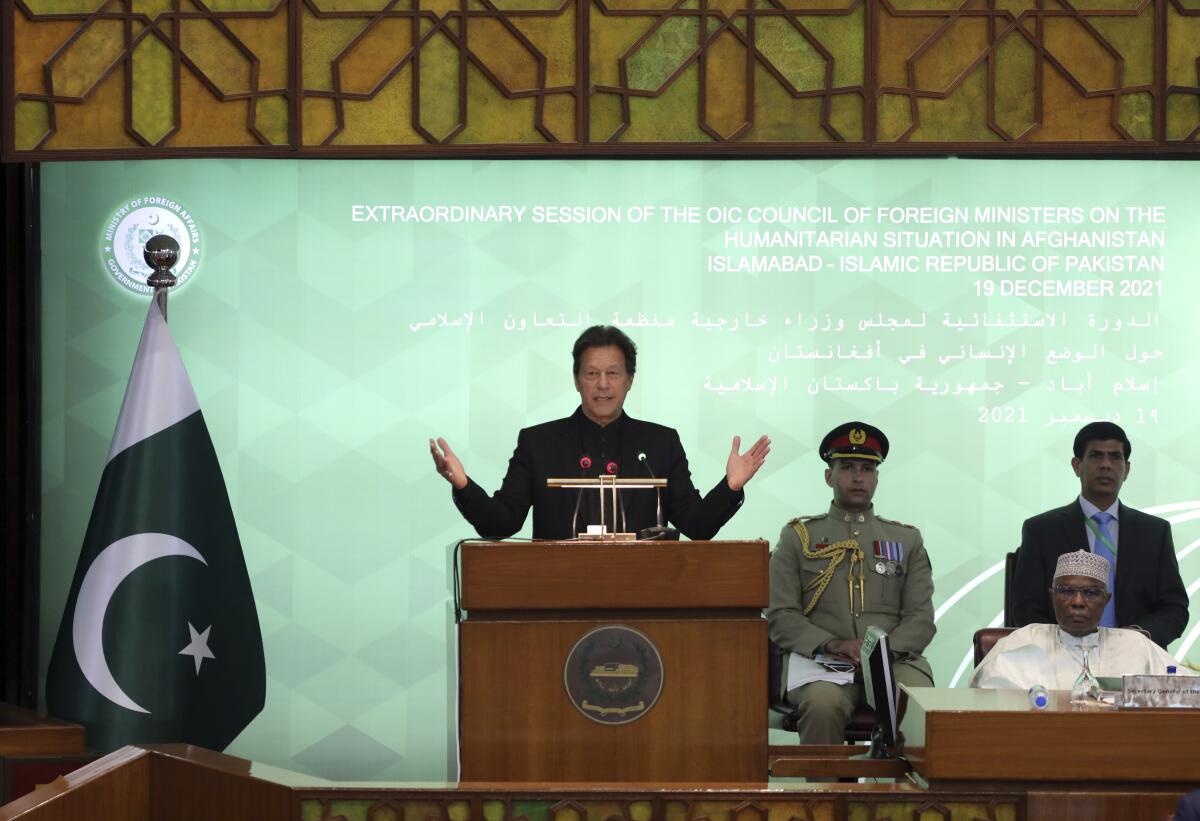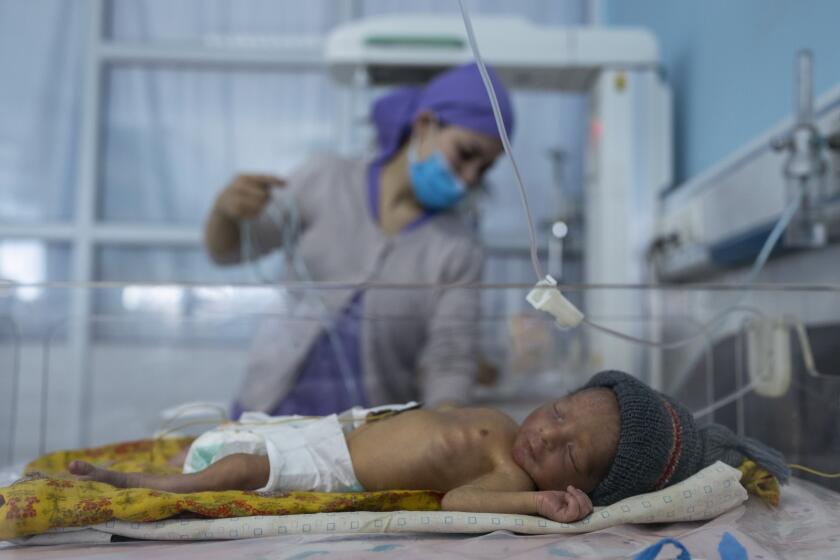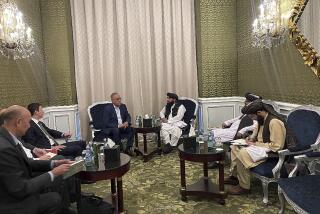Islamic world pitches ways to aid desperately poor Afghanistan

- Share via
ISLAMABAD, Pakistan — Islamic countries scrambled on Sunday to find ways to help Afghanistan avert an imminent economic collapse they say would have a “horrendous” global impact.
The hastily called meeting of the Organization of Islamic Cooperation in Islamabad ended with a promise to set up a fund to provide humanitarian aid through the Islamic Development Bank, which would provide a cover for countries to donate without dealing directly with Afghanistan’s Taliban rulers.
In a news conference at the end of the summit, Pakistan’s Foreign Minister Shah Mahmood Qureshi also described what he called good news from the United States, whose special representative on Afghanistan, Tom West, attended the summit.
He said West met with the Taliban delegation led by the interim foreign minister, Amir Khan Muttaqi, on the sidelines. Qureshi said West also said that he was mandated to “engage ” with the Taliban, that U.S. humanitarian aid to Afghanistan would not carry preconditions and that there could be as much as $1.2 billion available through the World Bank in money that could be released to Afghanistan.
There was no immediate response from the U.S. to Qureshi’s statements.
There has been a growing call for the U.S. and other countries to release upward of $10 billion in frozen Afghan assets. However, previously the U.S. has said at least some of that money is tied up in litigation involving the survivors and the families of victims of the Sept. 11 terrorist attacks carried out by Al Qaeda while being harbored in Afghanistan by the Taliban during its previous rule.
Sunday’s summit brought together dozens of foreign ministers as well as the special representatives on Afghanistan of major powers, including China, the U.S. and Russia. It also included the U.N. undersecretary general on humanitarian affairs, and the president of the Islamic Development Bank Muhammad Sulaiman Al Jasser, who offered several concrete financing proposals. He said the IDB can manage trusts that could be used to move money into Afghanistan, jumpstart businesses and help salvage the deeply troubled economy.
Hospitals in Kabul are running out of supplies, including fuel to produce supplemental oxygen for COVID-19 patients and essential drugs.
At the outset of the summit, several participating nations called for a quick opening of the country’s banking system and collectively, with the United Nations and international banking institutions, a plan to provide assistance to Afghanistan. Pakistan’s Prime Minister Imran Khan directed his remarks to the U.S., urging Washington to drop preconditions for releasing desperately needed funds and restarting Afghanistan’s banking systems.
Khan seemed to offer the Taliban a pass on its limits on education for girls, urging the world to understand “cultural sensitivities” and saying human rights and women’s rights meant different things in different countries. Still other speakers, including the Organization of Islamic Cooperation Chairman Hussain Ibrahim Taha, emphasized the need for the protection of human rights, particularly those of women and girls.
“This gathering is about the Afghan people,” said Qureshi, who warned that without immediate aid, Afghanistan was certain to collapse. The consequences would be “horrendous,” he said, not just in Afghan lives lost to starvation and disease — but also what would most certainly create a mass exodus of Afghans. He predicted chaos would spread, allowing terrorism and the drug trade to flourish.
Martin Griffiths, the U.N. undersecretary for humanitarian affairs and emergency relief coordinator, warned that Afghanistan cannot survive on donations alone. He urged donor countries to show flexibility, allowing their money to pay salaries of public sector workers and support “basic services such as health, education, electricity, livelihoods, to allow the people of Afghanistan some chance to get through this winter and some encouragement to remain home with their families.”
Beyond that, Griffiths said, “We need constructive engagement with the de facto authorities to clarify what we expect from each other.”
Afghanistan’s teetering economy, he added, requires decisive and compassionate action, or “I fear that this fall will pull down the entire population.”
Griffiths said families simply do not have the cash for everyday purchases like food and fuel, as prices soar. The cost of fuel is up by around 40%, and most families spend 80% of their money just to buy food.
He rattled off a number of stark statistics.
“Universal poverty may reach 97% of the population of Afghanistan. That could be the next grim milestone,” he warned. “Within a year, 30% of Afghanistan’s GDP could be lost altogether, while male unemployment may double to 29%.”
Next year the U.N. would be asking for $4.5 billion in aid for Afghanistan — its single largest humanitarian aid request, he said.
In what appeared to be a message to the Taliban delegation, Qureshi and subsequent speakers, including Taha, emphasized the protection of human rights, particularly those of women and girls.
In an interview with the Associated Press last week, Muttaqi said that Afghanistan’s new rulers were committed to the education of girls and women in the workforce.
Yet four months into Taliban rule, girls are not allowed to attend high school in most provinces, and though women have returned to their jobs in much of the healthcare sector, many female civil servants have been barred from coming to work.
At the summit’s conclusion Qureshi said the Organization of Islamic Cooperation agreed to appoint a special representative on Afghanistan. The 20 foreign ministers and 10 deputy foreign ministers in attendance also agreed to establish a greater partnership with the United Nations to get help to desperate Afghans.
The participants also emphasized the critical need to open Afghanistan’s banking facilities, which have been largely closed since the Taliban takeover Aug. 15. The Taliban has limited withdrawals from the country’s banks to $200 a month.
“We collectively feel that we have to unlock the financial and banking channels because the economy cannot function and people cannot be held without banking services,” Qureshi said.
Iran, which is home to 3 million Afghans, with thousands more arriving daily, is sending more and more refugees back — into the hands of the Taliban.
More to Read
Sign up for Essential California
The most important California stories and recommendations in your inbox every morning.
You may occasionally receive promotional content from the Los Angeles Times.











